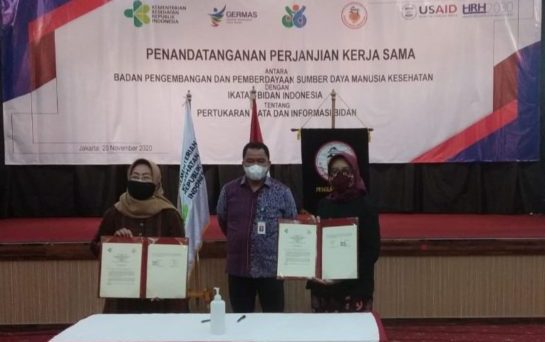
22 Apr Integrating Data on Indonesia’s Midwives to Strengthen the Country’s Human Resource Information System
The Indonesian Ministry of Health (MOH) continues to expand the capabilities of its health workforce information system by engaging stakeholders from across the entire health labor market, with efforts underway to integrate data from the country’s expansive midwifery workforce into its health worker registry.
In November 2020, the MOH signed an agreement with Indonesia’s Midwifery Association (Ikatan Bidan Indonesia, or IBI) to share data and work together to better manage and optimize midwives’ contribution to the health workforce. IBI membership has hundreds of thousands of midwives across the health system – including those who are private and independent – and the MOH, among other things, manages midwifery registration and licensure data. Bringing these two agencies together allows for an impactful partnership as integrating their data will provide a more robust picture of health workforce capacities for both the MOH and IBI. According to Dr. Emi Nurjasmi, Chairman of the Central Board of IBI, this data integration agreement is important not only for enhancing data accuracy, but also for empowering the workforce and guiding future planning and policy decisions. In addition, data integration will advance the understanding of how midwives contribute to improving quality maternal and child health care.
The signing of this agreement marked the first time the MOH has formalized a partnership with one of the country’s professional associations to align data on its members. Since signing the agreement last year, the Board of Human Resources for Health Empowerment and Development (BPPSDMK), the Health Workers Professional Council of Indonesia (KTKI), IBI, and HRH2030 have been working to clean and standardize data and establish technical standard operating procedures for the integration of data representing nearly 400,000 midwives.
The HRH2030 Indonesia activity, funded by USAID, is working to increase the availability and use of quality, real-time data to respond to health workforce challenges, with the goal of improving maternal and newborn health outcomes. The maternal mortality ratio is high in Indonesia, compared to neighboring countries (177 per 100,000 live births) but the percentage of births supported by a skilled attendant has been rising, largely attributed to the support of midwives, who assisted in more than 60 percent of deliveries over the last five years. To respond to the country’s health challenges, HRH2030 has been supporting the BPPSDMK to build a connected ecosystem of health workforce data, to improve the availability and use of quality health workforce data. This includes strengthening the functionality of the existing human resource information system (known as the SI-SDMK) to better respond to the needs of all users for health workforce data.
To support the MOH-IBI agreement, HRH2030 Indonesia helped to bring these two entities and other relevant stakeholders together and has also facilitated the technical discussions around the governance structure and interoperability between the systems. These discussions covered an analysis of the legal considerations of data exchange, identifying which data points should be exchanged, mapping the data points, developing common definitions, and developing the mechanisms for the exchange of data between the two systems.
The path to developing the MOU sparked interesting and informative discussions between the MOH and IBI, regarding the various levels of midwifery qualifications, certifications, and licensing, and even the types of midwives who will be considered in the data exchange. IBI, for example, includes data on midwives who do not deliver health system services—such as those who work in educational institutions as lectures and researchers. This was the first time such discussions had been held, and they are continuing with members of the National Health Workforce Accounts Technical Working Group, to ensure data on midwives from both the public and private sector will be used for evidence-based action and planning.
Moving forward, best practices from this process will be documented and the BPPSDMK plans to replicate this process with other professional associations, to ensure the continued expansion of health worker data in SI-SDMK for optimization of the entire health workforce.
From left to right: Dr. Emi Nurjasmi, Chairman of the Central Board of the Indonesian Midwives Association; Dr. Maxi Rein Rondownuwu, Head of the Center for HRH Planning and Utilization at the BPPSDMK; and Dr. Trisa Wahjuni Putri, Secretary of the BPPSDMK, showing the signed Memorandum of Understanding between the two organizations.





